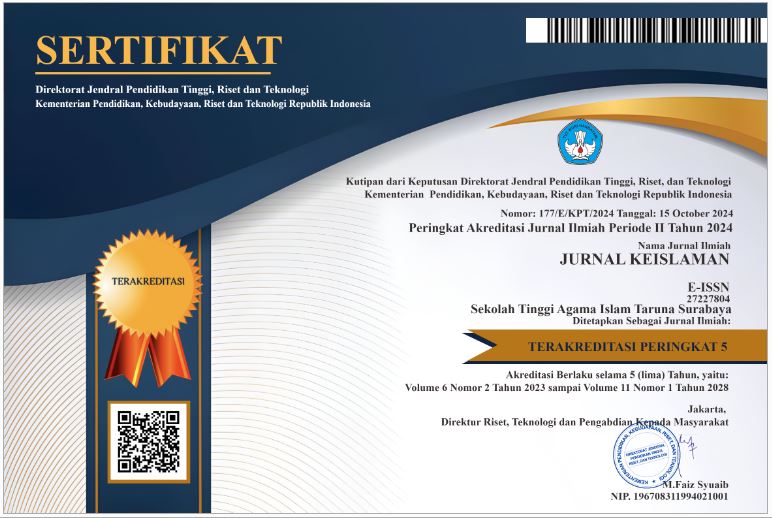Internalisasi Nilai-Nilai Keislaman Dalam Konsep Baiti Jannati Keluarga Asatidzah
DOI:
https://doi.org/10.54298/jk.v8i1.380Keywords:
Baiti Jannati, Harmonious Family, TranquilityAbstract
This research discusses the concept of "Baiti Jannati" or "My Home is My Paradise" as an ideal in forming a harmonious family (usrah sakinah) among the asatidzah (Islamic teachers) of Sekolah Tinggi Dirasat Islamiyah. Emphasizing Islamic values and the teachings of the Qur'an and Hadith, this paper analyzes the importance of the roles of husbands and wives in creating a harmonious and happy household. Using a qualitative method involving interviews with 11 asatidzah, this study identifies key elements required to achieve family harmony and the faktors that may hinder the implementation of this concept. The results indicate that the application of religious values and effective communication between spouses are vital aspects in creating an ideal family. Enhancing moral education within the family environment is also recommended to strengthen the foundation of the "Baiti Jannati" concept in daily practice.
Downloads
References
Ahmad Nihal Munachifdlil Ula, Hanik Hidayat, “Harmoni Sosial dalam Perspektif Islam: Tinjauan Terhadap Masyarakat Kontemporer” Jurnal Keislaman, Vol. 7 No. 1 (2024) https://doi.org/10.54298/jk.v7i1.252
Al-Bukhori, Muhamad bin Ismail. Adabul mufrod (dar al-basyair al-islamiyah : Bairut, 1989 M)
Al-Bukhori, Muhammad bin Islmail, Shohih Bukhori (dar ibnu katsir : bairut, 1987)
Al-Quran Al-Karim
Ari Abdul Kohar Rahmatullah, Agus Ruswandi, Annisa Nur Azizah, Nurkholipah, Puput Putriani, “Strategi Guru dalam Mengembangkan Nilai Agama dan Moral pada Anak Usia 4-6 Tahun, “Jurnal Keislaman, Vol. 7 No. 1 (2024)https://doi.org/10.54298/jk.v7i1.253
As-saukaniy, Muhammad bin Ali. Nailul author syarh muntaqol akhbar (bait afkar dauliyah : Saudi Arabia)
As-syaibani, Ahmad bin hambal. Musnad Imam Ahmad bin Hambal (Muassasah ar-risalah, 2001 M)
Departemen Agama RI, Pedoman Konselor Keluarga Sakinah, (Jakarta, Departemen Agama, 2001)
Hairul Fauzi, et al. “The Effectiveness of Principal Leadership in Managing a Tahfidz- Based Curriculum ”. Indonesian Research Journal in Education |IRJE|, vol. 8, no. 2, Dec. 2024, pp. 802-23, doi:10.22437/irje.v8i2.41524.
Haris, Muhammad. Pendidikan Islam Dalam Perspektif Prof. HM Arifin." Jurnal Ummul Qura Vol VI 1 (2015).
Haris, M., and Hidayatul Mufidah. “Implementation of Civic Education in Increasing Religious Tolerance in Elementary Schools in the 21st Century”. Athena: Journal of Social, Culture and Society, vol. 3, no. 1, Feb. 2025, pp. 468-75, doi:10.58905/athena.v3i1.388.
https://www.academia.edu/26339881/MAKALAH_PENDIDIKAN_AGAMA_ISLAM_Keluarga_Sakinah Diakses 21:28 ,20/11/2024
https://www.bps.go.id/linkTableDinamis/view/id/893 Diakses 09:45 ,21/11/24
Ibrahim Musthofa dkk, kamus Al-Wasith (Dar Ad-da’wah)
Sari, M., and M. Haris. "Penanaman Nilai-Nilai Agama Islam dalam Pembentukan Karakter dan Etika Siswa di Tingkat Sekolah Dasar. Islamic Education Journal, 1 (1), 54–71." 2023,
Tim Penyusun, Kamus Besar Indonesia. (Pusat Bahasa Dep. Pendidikan Nasional, Jakarta:2008)
Zuman Malaka, “Prespektif Pendidikan Islam Terhadap Poligami”, Jurnal Keislaman, Vol. 7 No. 1 (2024) https://doi.org/10.54298/jk.v7i1.234
Downloads
Published
How to Cite
Issue
Section
License
Copyright (c) 2025 Muh. Rujib Abdullah

This work is licensed under a Creative Commons Attribution-ShareAlike 4.0 International License.
Authors who publish with this journal agree to the following terms:
- Authors retain copyright and grant the journal right of first publication with the work simultaneously licensed under a Creative Commons Attribution-ShareAlike 4.0 that allows others to share the work with an acknowledgement of the work's authorship and initial publication in this journal.
- Authors are able to enter into separate, additional contractual arrangements for the non-exclusive distribution of the journal's published version of the work (e.g., post it to an institutional repository or publish it in a book), with an acknowledgement of its initial publication in this journal.
- Authors are permitted and encouraged to post their work online (e.g., in institutional repositories or on their website) prior to and during the submission process, as it can lead to productive exchanges, as well as earlier and greater citation of published work (See The Effect of Open Access).


















